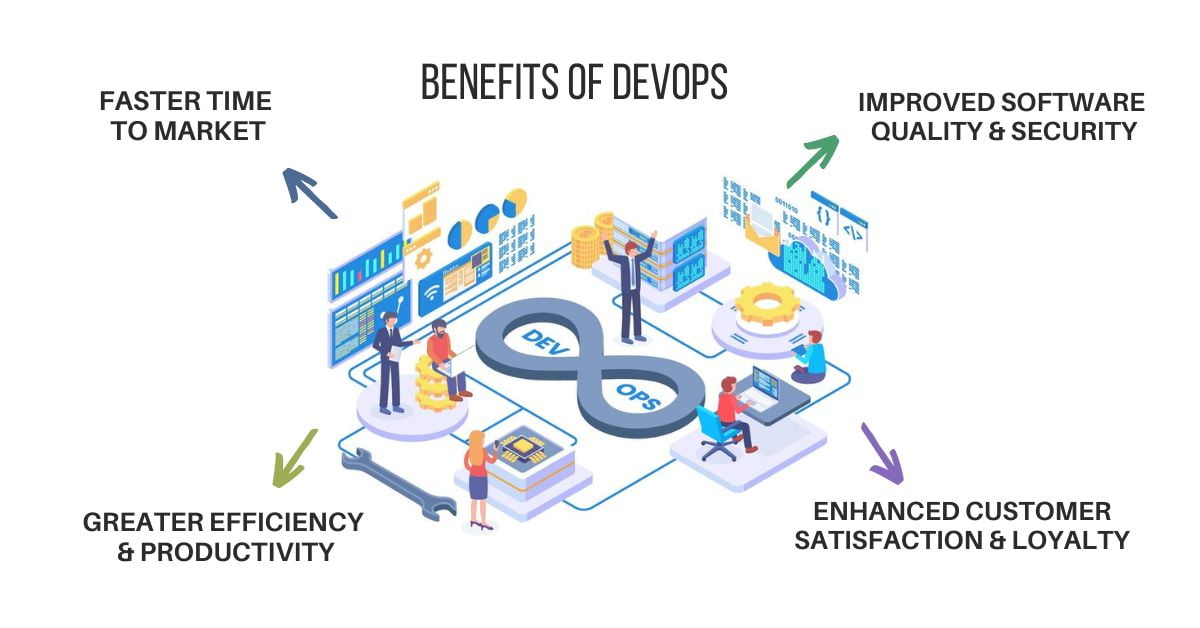Understanding the Role of DevOps in Digital Engineering
In today’s digital age, the success of any enterprise is increasingly dependent on its ability to deliver high-quality software products and services quickly and efficiently. To meet this demand, enterprises have turned to DevOps and digital engineering practices to streamline their software development and delivery processes.
DevOps methodology is an approach that emphasizes collaboration, automation, and continuous delivery, while digital engineering is a framework for developing, operating, and managing software systems that are scalable, resilient, and secure. In this article, we will explore the critical role of DevOps in enterprise digital engineering, including its key principles, benefits, challenges, and best practices for successful adoption.
What are DevOps and Digital Engineering?
DevOps is a software development approach that bridges the gap between development and operations teams, ensuring a seamless and continuous software delivery pipeline. It emphasizes collaboration, communication, automation, and monitoring to reduce errors and speed up the development process.
Digital Engineering, on the other hand, is a broad concept that encompasses the use of digital technologies to design, develop, and deliver products and services. It involves the integration of software, hardware, and data to drive innovation, improve efficiency, and enhance customer experience.
Why are DevOps and Digital Engineering Important?
DevOps and Digital Engineering are increasingly critical for organizations seeking to stay competitive in the digital age. By leveraging modern technologies and methodologies, they can streamline their operations, reduce costs, and improve agility. They also enable organizations to respond rapidly to market demands, innovate faster, and deliver high-quality products that meet customer expectations.
The Evolution of Digital Engineering
The History of Digital Engineering
Digital Engineering has come a long way since the early days when companies relied on paper-based systems and manual processes. With the advent of computers and software, organizations began to automate their operations and improve efficiency through digital technologies.
In recent years, the rise of cloud computing, the Internet of Things (IoT), and big data analytics has transformed the way organizations approach digital engineering. They now have access to vast amounts of data, which they can use to gain insights into customer behavior, optimize processes, and drive innovation.
The Impact of digital transformation on Digital Engineering
Digital transformation has had a profound impact on Enterprise Digital Engineering, enabling organizations to leverage innovative technologies to drive innovation and improve efficiency. It has also created new challenges, such as the need to manage multiple platforms and tools, ensure data security and compliance, and address the skills gap.
The Key Principles and Importance of DevOps in Enterprise Applications
1. The principle of continuous integration
Continuous integration is the practice of regularly merging code changes into a central repository and testing them automatically. It helps to identify issues early in the development process, reducing the risk of bugs and improving software quality.
2. The principle of continuous delivery and deployment
Continuous delivery and deployment involve automating the process of releasing software to production. It allows organizations to release updates more frequently, reducing downtime and improving the user experience.
3. The principle of continuous testing and monitoring
Continuous testing and monitoring are critical to ensure software quality and performance. It involves testing software throughout the development cycle and monitoring it in production to identify issues and improve performance.
4. The principle of collaboration and communication
Collaboration and communication are essential in DevOps and Digital Engineering, enabling teams to work together seamlessly and share knowledge and information. It helps to reduce errors, speed up development, and improve the overall quality of software.
Benefits of DevOps in Digital Engineering
1. Faster time-to-market
Implementing DevOps in Digital Engineering can significantly reduce the time to market for new products and features. By automating processes and eliminating manual tasks, organizations can release software updates quickly and efficiently.
2. Greater efficiency and productivity
DevOps can improve the efficiency and productivity of development teams, allowing them to focus on delivering value to customers. By automating routine tasks, developers can spend more time on innovation and problem-solving.
3. Improved software quality and security
DevOps emphasizes continuous testing, monitoring, and collaboration, which helps to improve software quality and security. By identifying issues early in the development cycle and addressing them quickly, organizations can reduce the risk of security breaches and other problems.
4. Enhanced customer satisfaction and loyalty
By leveraging DevOps and Digital Engineering, organizations can deliver high-quality products and services that meet customer expectations. This can lead to greater customer satisfaction and loyalty, improving the bottom line for businesses.
Familiar challenges in DevOps adoption
While the benefits of DevOps adoption in enterprise digital engineering are significant, implementing DevOps methodology is not without its challenges. One of the most familiar challenges is cultural resistance. Another major challenge is legacy systems that are not designed to be compatible with DevOps practices.
- Lack of Skilled Resources: DevOps adoption requires a separate set of skills, including automation and scripting, continuous integration and delivery, and cloud infrastructure. The skill set required for DevOps is unique and is not present in traditional IT (Information Technology) professionals. A lack of skilled resources can hinder DevOps adoption, and enterprises must invest in upskilling their workforce to meet the DevOps requirements.
- Integration: Next challenge is the integration of DevOps with existing systems. Enterprises have invested heavily in their existing systems, and DevOps adoption requires integration with these systems. Integration with existing systems is a complex task, and legacy systems can be difficult to work with. The integration process should be carefully planned and executed to ensure a smooth transition.
- Lack of Coordination: Next challenge is the lack of coordination between teams. DevOps culture requires collaboration and coordination between different teams, such as development, operations, and security. Lack of coordination between teams can lead to delays and errors, affecting the overall quality of the product. Effective communication and coordination are necessary to overcome this challenge.
To overcome these challenges, enterprises must adopt careful planning and strategy, invest in upskilling their workforce, ensure effective communication and coordination, and obtain management support. DevOps adoption will be beneficial overall, improving the overall quality of the product and providing faster and better services to customers.
Read more: What’s The Impact of DevOps on Business Continuity?
Best Practices for DevOps Implementation
Best practices include starting with a small pilot program, leveraging automation to streamline the process, and focusing on continuous improvement. Let us help you in understanding DevOps implementation best practices for enterprises.
1. Agile Project Management
In DevOps implementation agile project management combines two methodologies that are focused on delivering software quickly while ensuring that it is of high quality. Agile project management involves breaking down work into smaller, manageable chunks and delivering them iteratively with a focus on customer feedback and collaboration.
DevOps, on the other hand, is a set of practices that emphasizes collaboration and communication between software developers and IT operations to speed up the development and delivery of software. Together, Agile project management and DevOps create a powerful approach to software development that emphasizes speed, collaboration, and quality.
By using Agile project management in DevOps implementation, organizations can build software that meets the needs of customers, adopts rapidly changing requirements, and improves the speed and efficiency of the development process.
2. Continuous Integration and Delivery
Agile CI/CD (Continuous Integration/Continuous Deployment) is a development approach that optimizes software delivery by enabling the fast and frequent release of new code. In DevOps implementation, Agile CI/CD allows for an iterative and collaborative approach to software development, testing, and deployment.
By continuously integrating new code changes into the main codebase, developers can quickly identify and address any issues or errors, while also providing real-time feedback on code quality and performance.
Additionally, the continuous deployment aspect of Agile CI/CD means that new features and updates can be deployed to production environments automatically and with minimal downtime, resulting in faster and smoother software releases. Overall, Agile CI/CD is a crucial element of DevOps implementation that can deliver significant benefits to development teams and end-users alike.
3. Automation
Agile automation in DevOps implementation refers to the use of automated processes and tools to carry out development, testing, and deployment activities in an agile environment. This methodology integrates the principles of Agile and DevOps to deliver software products that are efficient, reliable, and scalable. Agile automation focuses on continuous integration and continuous delivery (CI/CD) that ensures faster and more efficient delivery of changes to the production environment.
It involves the automation of various tasks such as code reviews, testing, and building, which enables teams to focus on more important tasks and reduces the turnaround time. Agile automation has become a critical component of DevOps implementation, enabling teams to deliver high-quality software products faster, with reduced costs, and improved customer satisfaction.
4. Change the culture
DevOps is a methodology designed to integrate software development and IT operations. It leverages a culture that emphasizes collaboration, automation, and communication among various departments of an organization. This culture of enterprise digital engineering facilitates the creating, testing, and deploying of software at a rapid pace, allowing Digital transformation in businesses to respond quickly to the changing business environment.
DevOps incorporates this culture into the software development process, allowing teams to work together seamlessly, resulting in a more efficient and effective product development cycle. By leveraging the culture of enterprise digital engineering, DevOps empowers organizations to realize the benefits of a collaborative, agile, and automated approach to software development operations.
Also Read: Biggest DevOps Mistakes You Must Avoid
How to Measure the Success of DevOps in Digital Engineering?
To measure the success of DevOps in enterprise digital engineering, organizations should track key metrics such as deployment frequency, lead time for changes, and mean time to recovery. They should also monitor customer feedback and satisfaction to ensure that DevOps is delivering value to end-users.
The Future of DevOps and Digital Engineering
New Trends and technologies shaping the Future of DevOps and Digital Engineering
The future of DevOps and digital engineering is heavily influenced by the adoption of emerging technologies such as cloud computing, containerization, and serverless architecture. Artificial intelligence and machine learning will also play a significant role in automating and optimizing DevOps processes.
The Role of DevOps and Digital Engineering in the Age of artificial intelligence and machine learning
The role of DevOps and digital engineering will become even more critical in the age of artificial intelligence and machine learning. These advanced technologies require highly efficient and reliable infrastructure to function effectively. DevOps practices such as automated testing and continuous delivery will ensure that companies can take full advantage of AI and ML without introducing errors or delays.
Key Takeaways from Successful DevOps Implementations in Digital Engineering
Successful DevOps implementations require a well-defined roadmap, buy-in from leadership, a comprehensive training program, and a focus on continuous improvement. The benefits of using DevOps in enterprise digital engineering are significant, including increased deployment frequency, faster lead times for changes, improved customer satisfaction, and cost savings.
The importance of DevOps in enterprise digital engineering cannot be overstated. DevOps practices enable organizations to deliver high-quality software faster and more efficiently, which is critical for achieving digital transformation and remaining competitive in today’s fast-paced market.
Also Read: How Cloud Computing Can Help Businesses? A Comprehensive Guide
Final Thoughts on the Future of DevOps and Digital Engineering
The future of DevOps and digital engineering looks bright, with emerging technologies and a renewed emphasis on digital transformation in the enterprise.
DevOps plays a critical role in enabling enterprises to meet the demands of the digital age by streamlining their software development and delivery processes. By embracing DevOps and digital engineering practices, enterprises can deliver software products and services faster, more efficiently, and with higher quality. As technology continues to evolve, enterprises need to stay ahead of the curve by embracing the latest trends and technologies and leveraging the power of DevOps to drive innovation and competitiveness in the digital age.
How does OTS Solution help you in Implementing Expert DevOps Consulting Services?
OTS Solutions possess 20+ years of experience in building enterprise software development. Our developers have expertise in the latest technologies such as DevOps, Cloud Computing, Artificial Intelligence, etc. We are currently working on leveraging digital engineering solutions & services.
Connect with us if you want to grow your business and stay ahead of the competition.
Ready to revolutionize your digital engineering process?
Explore the power of DevOps and unleash innovation in your projects. Partner with our expert team to optimize collaboration and accelerate software delivery.
Frequently Asked Questions:
1. What is the difference between DevOps and digital engineering?
Ans. DevOps is an approach that emphasizes collaboration, automation, and continuous delivery in the software development and delivery process. Digital engineering is a framework for developing, operating, and managing software systems that are scalable, resilient, and secure. While DevOps focuses on improving software delivery processes, digital engineering focuses on building software systems that are robust and reliable.
2. What are the benefits of implementing DevOps in digital engineering?
Ans. The benefits of implementing DevOps in enterprise digital engineering include:
- faster time-to-market
- greater efficiency
- productivity
- improved software quality & security
- enhanced customer satisfaction & loyalty.
DevOps enables enterprises to deliver high-quality software products and services quickly and efficiently, which is essential in today’s digital age.
3. What are the challenges of adopting DevOps in large organizations?
Ans. To overcome the below mentioned challenges, clear strategy and roadmap is essential.
Common challenges in adopting DevOps in large organizations include:
- resistance to change
- lack of collaboration
- communication gaps,
- need to integrate with legacy systems
4. What is the future of DevOps and digital engineering?
Ans. The future of DevOps and digital engineering looks bright, with current trends and technologies shaping the landscape. As enterprises continue to embrace digital transformation, the demand for DevOps and digital engineering practices will only increase. In the age of AL/ML, & DevOps digital engineering plays a critical role in enabling enterprises to innovate.








